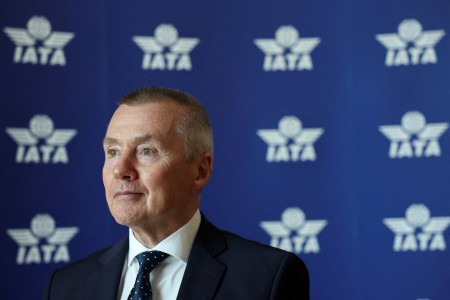By Tim Hepher, Lisa Barrington and Aditi Shah
DUBAI (Reuters) – Airlines and energy firms clashed over scarce availability of alternative fuels on Tuesday as carriers ended a three-day summit struggling to square near-record demand with supply chain problems and pressure to meet environmental goals.
The aviation industry has committed to reducing net emissions to zero by 2050 largely through plant-based Sustainable Aviation Fuels (SAF).
But with current supplies of SAF covering just 0.5% of the airlines’ fuel needs, disagreements surfaced during an annual meeting of the International Air Transport Association, attended by energy companies including France’s TotalEnergies.
“Total’s net earnings last year were $23.2 billion. The whole airline industry’s net earnings in 2023 were $27 billion,”
IATA Director General Willie Walsh said during a closing debate.
“The fuel companies who produce the problem … we need to see those companies like Total investing significant sums of money in the development of Sustainable Aviation Fuel. That’s the reality of where we are.”
The head of the French energy giant’s aviation and marine business defended its commitment to helping industries like aviation, which has few immediate alternatives, meet its goals.
“Thank you for raising our excellent results,” senior vice-president Louise Tricoire, responded during lively exchanges on stage in Dubai, adding that TotalEnergies already re-invests the bulk of its profit in renewable energy research.
“So I don’t agree that we don’t do our part with SAF; we are doing our part”.
SAF production doubled in 2023 and is expected to triple in 2024. But it costs three times more than kerosene and airlines reiterated this would have to be passed to consumers.
They also complain they are competing with other industries for access to limited renewable fuel capacity and need more support from governments to complete the ambitious switch-over.
Governments last year set an interim target of 5% lower emissions through the use of low-carbon fuels by 2030.
IATA stopped short of setting its own interim target, with members unwilling to be boxed in without widespread government policies to support the politically agreed goal, delegates said.
But Walsh said the trickle of available SAF made the interim goal look ambitious, while reaffirming the 2050 net zero target.
On the sidelines, some senior delegates privately questioned whether aviation could meet the 2050 target, adopted in 2021 to tie the sector’s climate action to the 2015 Paris accord.
The industry is trying to carry out the transition at the same time as meeting post-COVID demand – an effort Qantas Chief Sustainability Officer Andrew Parker likened to “heart surgery while running a marathon”.
In Europe, environmental groups say the challenge of meeting the targets is only made worse by the scale of the industry’s own growth, highlighted by figures released this week showing that IATA predicts almost $1 trillion of revenue in 2024.
“I don’t get that debate or argument being made when I go to India, China, Latin American or Africa, where it’s quite the opposite, where there is a genuine desire to see greater connectivity” Walsh told Reuters
Attended by a record 1,700 delegates, the June 2-4 summit was held in Dubai, the world’s largest international hub.
IATA’s next annual meeting will be in Delhi, capital to the world’s most populous nation and another aviation powerhouse.
(Additional reporting by Alexander Cornwell; editing by David Evans)











